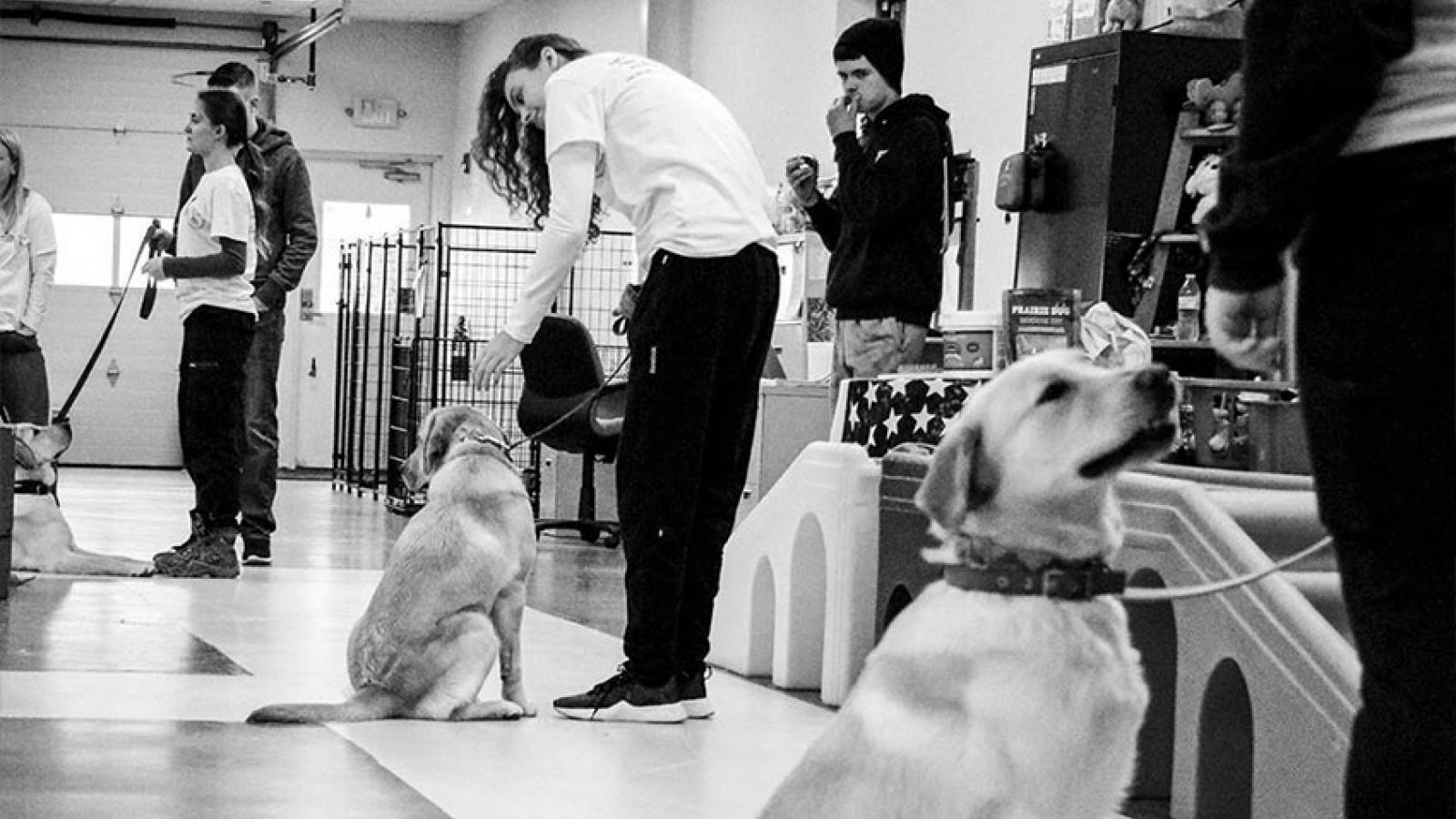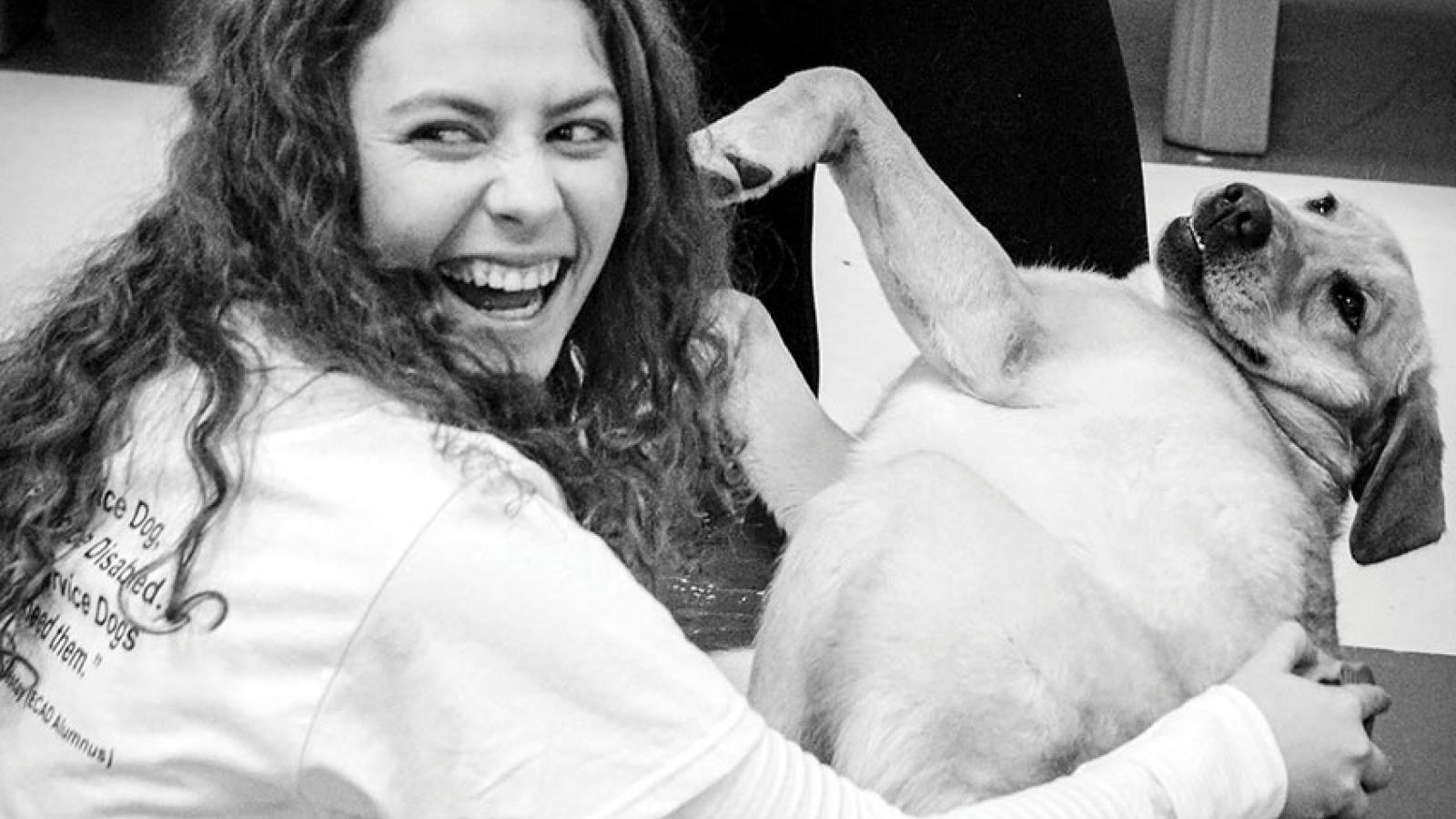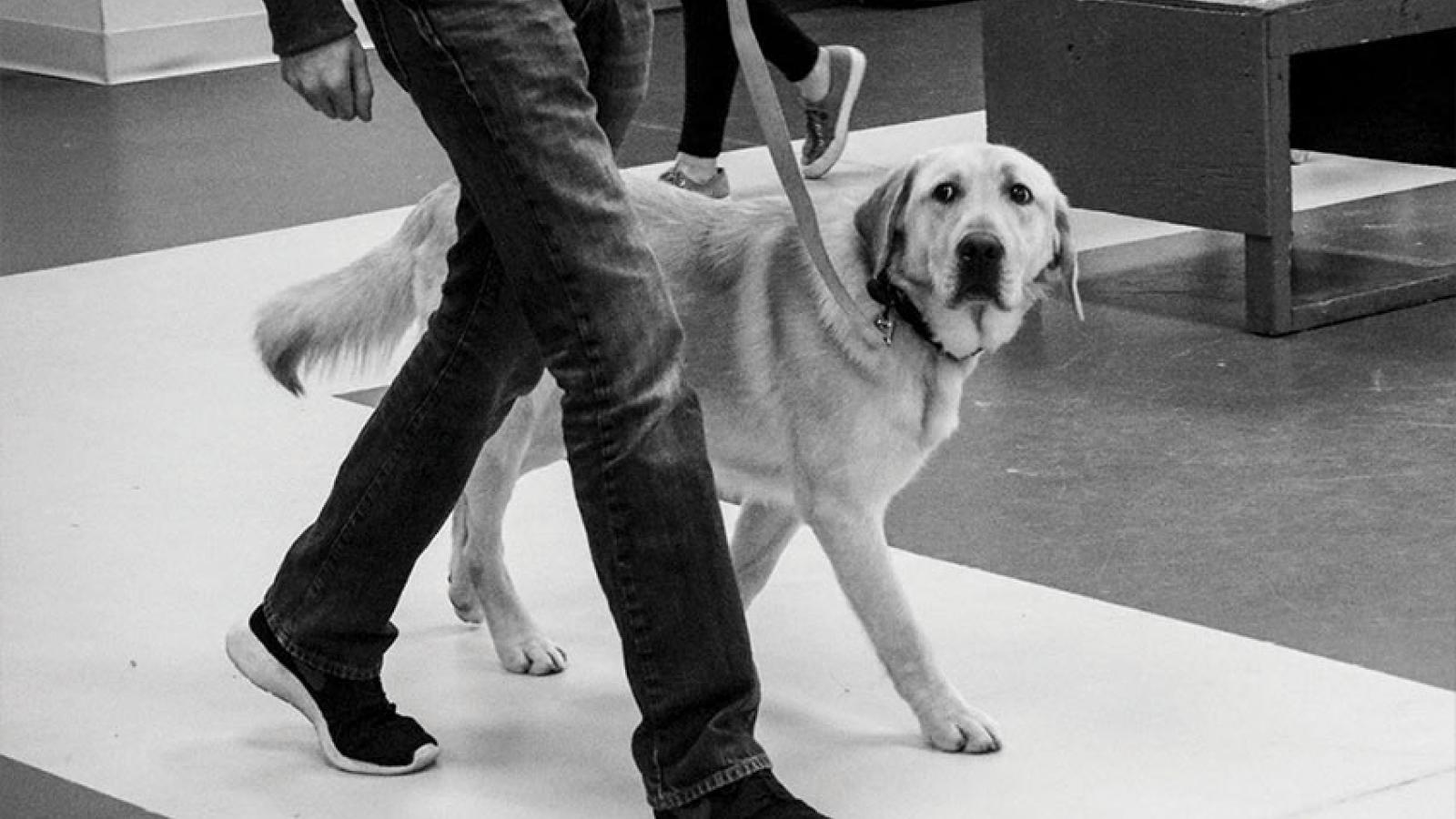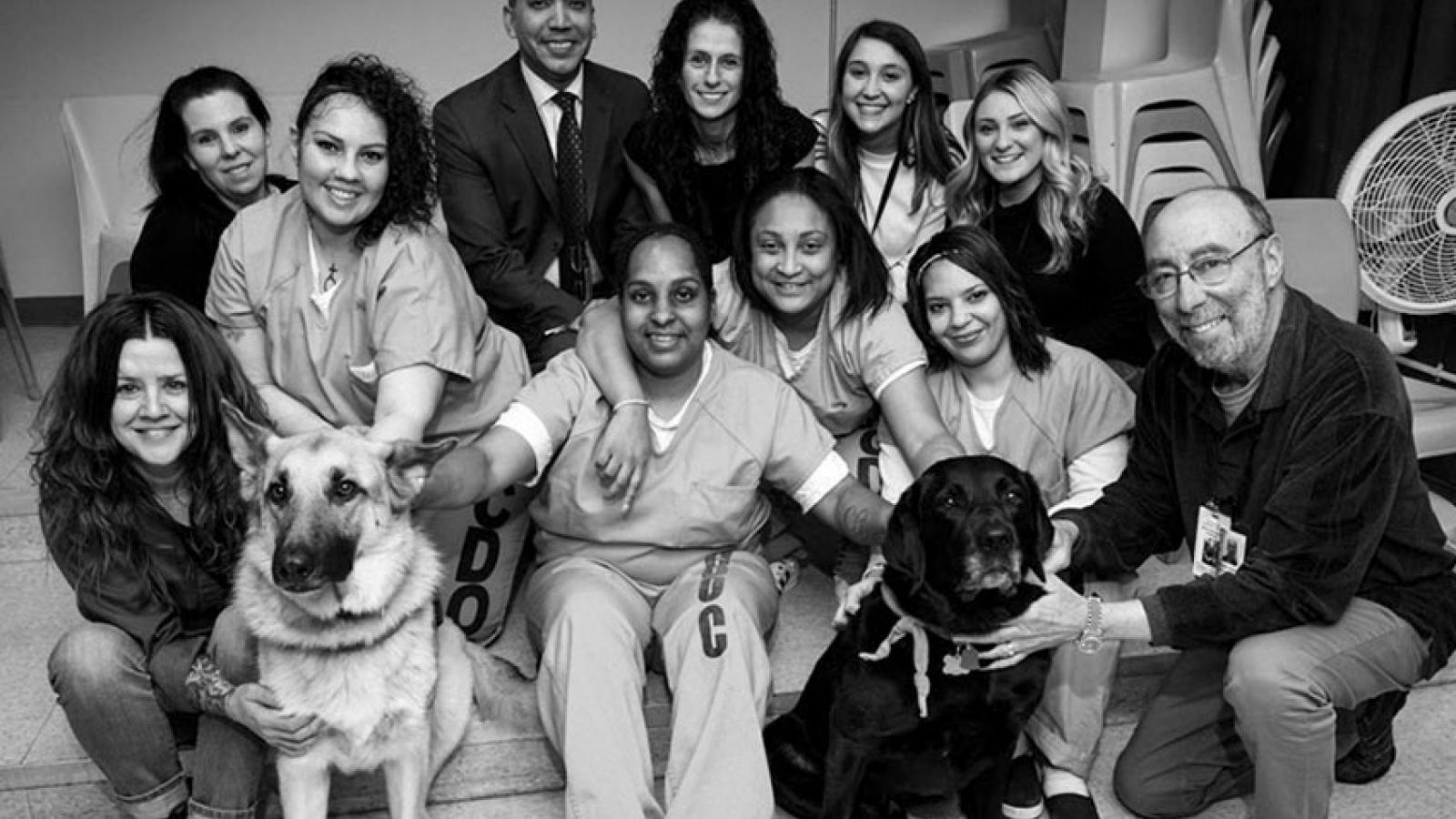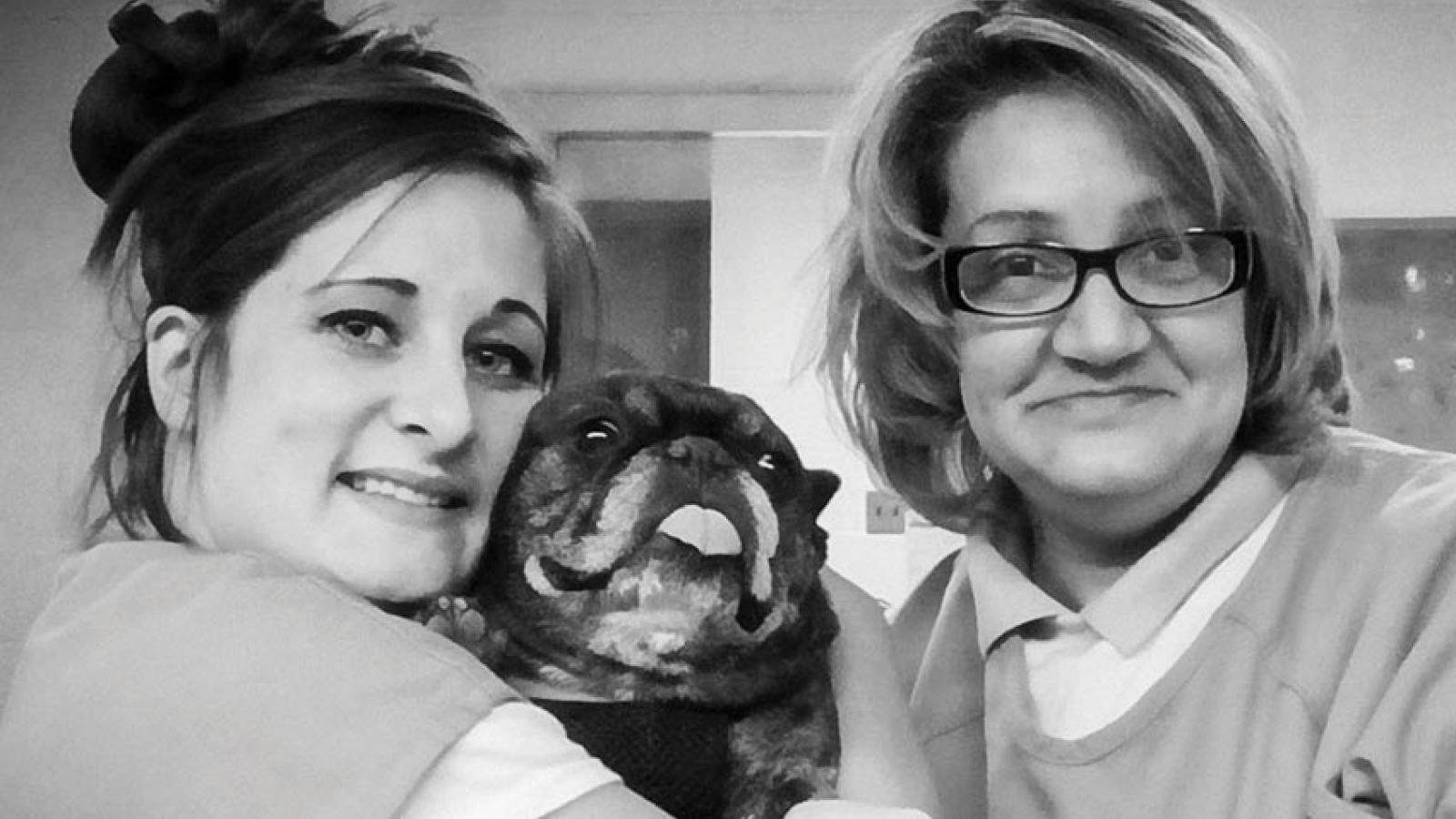Must Love Dogs
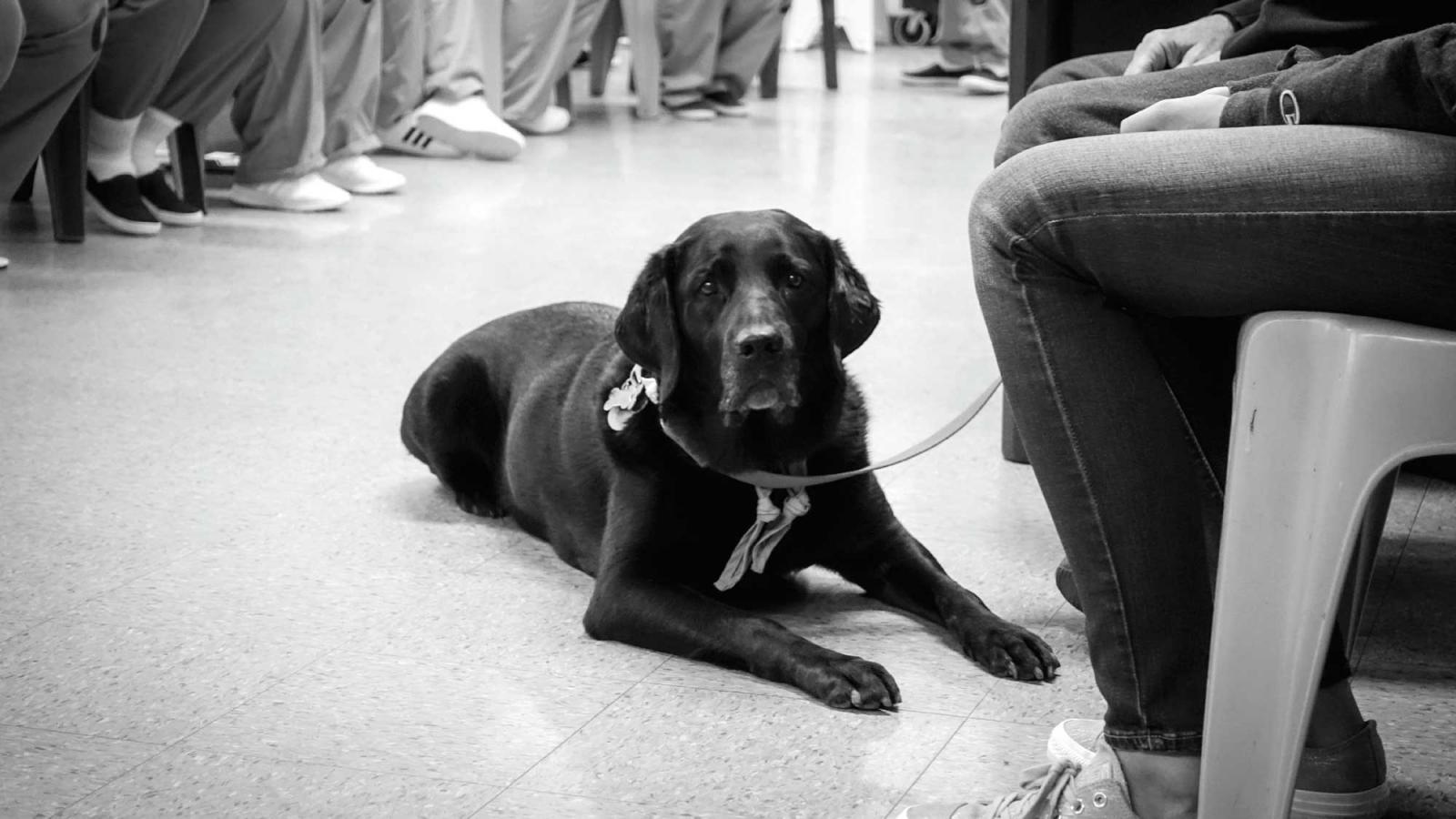
On a misty Saturday morning in February, College of Health Professions (CHP) Professor of Nursing Joanne Singleton, PhD; Pace’s service dog, Professor Spirit; and 25 CHP undergraduate students boarded a bus departing from Pace’s Pleasantville Campus. With coffees in hand, many students noted that while this 8:00 a.m. call-time was a departure from their traditional weekend sleep schedules, today was an exciting, special exception. The group was gearing up for a field visit to Educated Canines Assisting with Disabilities (ECAD), a nonprofit organization devoted to training service dogs who go on to be paired with individuals with disabilities.
The field trip to ECAD would be about a lot more than just playing with cute animals—although it would be a little bit of that, of course.
As the bus trudged down a foggy I-84E, Singleton began to discuss why an individual with a disability or a degenerative condition might benefit from a service dog—and from the perspective of a health care practitioner, the importance of adequately understanding the needs of individuals with service animals.
The First of Its Kind
For Singleton, her interest and subsequent educational activism surrounding service animals stems from a personal friendship. This thoughtful, inventive program was inspired by the late Luis Carlos Montalván, an Iraq War veteran whose life changed dramatically for the better after being paired with his service dog, Tuesday.
After hearing Montalván speak at a conference, Singleton realized there was a major gap between the level of care individuals with service dogs needed, and the level of care that most health care practitioners were able to provide—as the vast majority of nurses, doctors, and other health care practitioners have never been trained to treat individuals teamed with service animals.
In other words, she realized that health care practitioners should and could be doing better.
“As I listened to Luis, I realized, these health care providers he is talking about, this could me be!” said Singleton. “No one has ever taught me about this. As an educator, I have an opportunity to teach our health profession students about this, and make a real change.”
"As an educator, I have an opportunity to teach our health profession students about this, and make a real change.”
With the help of fellow CHP Professor Lucille Ferrara, EdD, she launched Canines Assisting in Health in 2017. It was the first college curriculum in the country of its kind, primarily dedicated to educating future health care professionals about the care of patients with disabilities who are—or may benefit from being—teamed with a service dog or those who participate in animal assisted therapies. This new curriculum focused on teaching students how to include service and therapy dogs in comprehensive care treatment plans.
Singleton became certified in the human-animal bond and animal-assisted interventions, and began thinking about what kinds of interventions could most positively affect veterans and other vulnerable populations. So she took her newfound knowledge, and applied it to effecting positive change on campus.
Educating Future Practitioners
The students descended the bus and headed into the ECAD facility—the main component of which consists of a spacious room designed specifically for service dog training. Through the guidance of ECAD co-founder Lu Picard, students were teamed up with service dogs in training, and engaged in a number of activities essential to both service dog care and training grooming, walking, and much more. Through this training—as well as a Paws & Breathe® session led by Singleton and Professor Spirit, a non-pharmalogical intervention where students assess their stress levels before and after snuggling and meditating with the Golden Retriever—students were better able to gain an understanding of the complexities and rewards surrounding service animals and health care.
Many students were surprised at the level of diligence required for proper service dog training and its unforeseen nuances—for instance, Picard stressed that service dog trainers should never, ever snap their fingers to gain a dog’s attention, as a disabled individual paired with a service dog may not have the ability to snap.
“At first, it was nerve-wracking to be thrown into the training,” said nursing student Caitlin Cullen ’22. “Overall, it was great to see the training process.”
Heading back to campus, students chatted animatedly amongst themselves—with many clearly finding the trip, as well as the larger initiative in which it is built around, both compelling and rewarding.
“Going into the health care field, it’s good to be aware of how to be appropriate and respectful of service dogs,” said Katherine Devaney ’22.
Parenting with Pups
While serving on the Community Corrections Advisory Board for Manhattan’s Metropolitan Correctional Center, Dyson Associate Professor of Criminal Justice Kimberly Collica-Cox, PhD, began to think about ways to implement rehabilitative programming that would benefit both incarcerated individuals and her criminal justice students.
After a number of fortuitous run-ins and countless hours of research, Collica-Cox and Dyson College, in conjunction with the Good Dog Foundation, started to lay the groundwork for what has ultimately become the groundbreaking Parenting, Prison, and Pups Program—an evidence based parenting program, which, through the use of therapy dogs and Pace students as teaching assistants, helps incarcerated women improve parenting skills and cope with the anxieties of parent-child separation.
Through this program, Collica-Cox and her criminal justice students visit the Manhattan Correctional Center and the Westchester County Department of Correction, and over the course of 14 sessions engage in animal-assisted simulations and training programs. Given that about 1.7 million children nationwide have a mother in jail or in prison, Collica-Cox believes that the strategies taught through this program can help enhance bonds between inmates and their children, reduce recidivism, and mitigate repetitive negative parenting patterns. On the undergraduate end, the course helps criminal justice students understand the complexities of facility management and the types of beneficial rehabilitative programs that are possible.
Wet Noses, Warm Hearts
“We use the dogs in two different ways. First, as an emotional support animal,” says Collica-Cox, which she notes can be quite important when individuals are disclosing personal information. Having the dogs be present with the women is a form of animal-assisted therapy. Petting the dogs, engaging with the dogs, and being present with the dogs has been shown to reduce stress, lessen anxiety, lower blood pressure and heart rate, and reduce the perceived feelings of loneliness.
“The other way is that we incorporate the dogs into actual curriculum lessons. If we were talking about things like problem-solving, we could use the dogs to start off with a problem. And then once they grasped the concept, moved to a more serious situation, like their children.”
“The dogs really help to open up lines of communication,” says Collica-Cox. “They serve as benign examples, and then we can get into deeper, emotional issues around parenting and children.”
For instance, if you are going on vacation—who will take care of your dog? If your dog is ill or eats a bad substance, how do you handle it? If your child keeps missing curfew, how do you respond? For one incarcerated mom, interviewed as part of a segment for News 12 Westchester, the opportunity to interact with therapy dogs like Fonzi, the admittedly handsome German Shepherd, gives her the space to talk about her children and her separation from them.
“Even though our children are not here, the class brings hope,” she said. “It brings all the mothers together.”
All in all, the program has been quite a success. Now entering its fourth year, it has received considerable regional and even national recognition. In 2018, Collica-Cox was awarded a prestigious national Jefferson Award for outstanding public service for her work.
Yet, arguably, the program’s real impact is exceedingly personal.
“The dogs really help to open up lines of communication,” says Collica-Cox. “They serve as benign examples, and then we can get into deeper, emotional issues around parenting and children.”
For one student, the experience of working with the Parenting, Prison, and Pups program was as much a class on humanity as it was civic engagement or criminal justice. “We got to see a population that is looked down upon, stigmatized, ridiculed,” he said. “But hearing [their stories] really hit me in the heart.”
Making an Impact
For both initiatives, there is still much to be done. One of Singleton’s long-term goals is to eventually affect policy, using evidence-based research to enter the insurance realm—and ask a forward-thinking insurance company to implement insurance support for individuals to be teamed with service dogs. And Collica-Cox hopes to gain further funding for the program so that it can continue to make a difference, and perhaps even expand.
Yet, while their work is ongoing, there’s no question that when it comes to animal-assisted therapy, Pace has both the bark and the bite to make a true impact.
